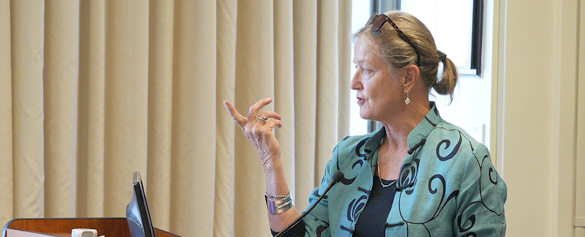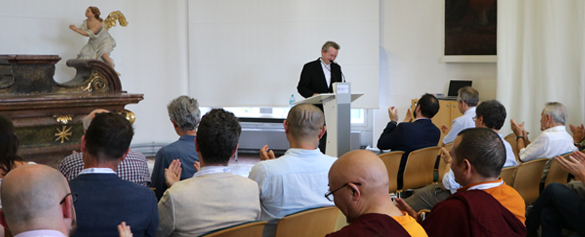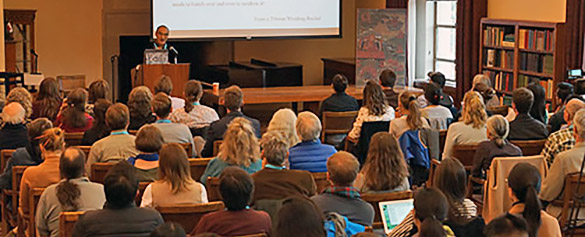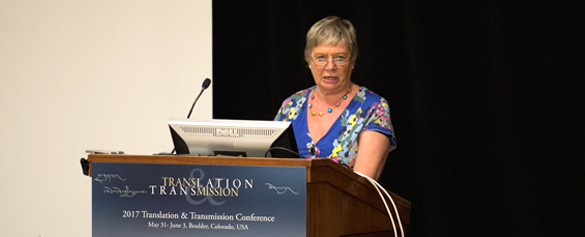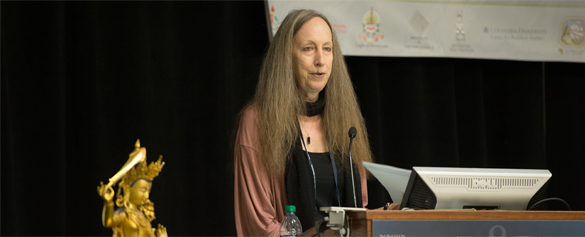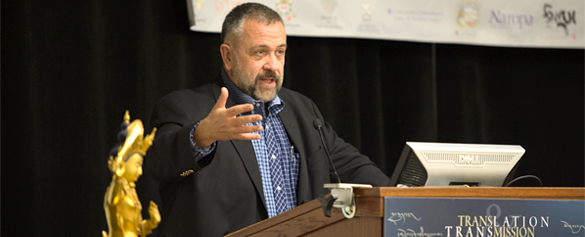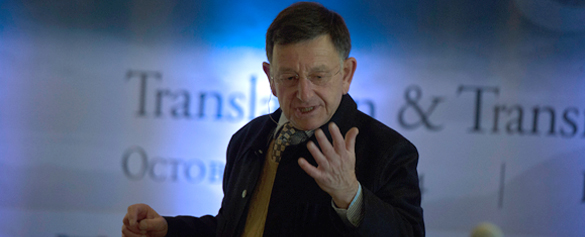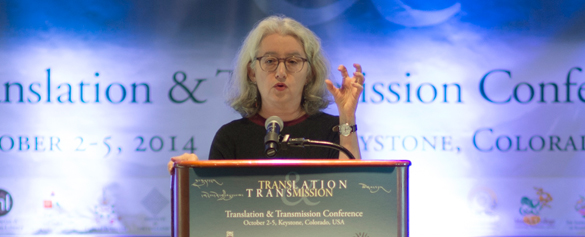Tathāgatagarbha: A Brief History
Marcus Perman2022-11-16T23:39:20-07:00A term of indefinite meaning and uncertain origin, tathāgatagarbha is one of the most inspiring, provocative, and controversial concepts in the vast literature of Buddhism. Variously interpreted as the promise of buddhahood for all, the promise of buddhahood for some, and a provisional teaching for those intimidated by emptiness, it has generated commentary from across the Mahāyāna world among many of the most influential masters of India, Tibet, China, Korea, and Japan. This lecture will seek to provide an overview of the history and influence of tathāgatagarbha.
An Act of Bardo: Translating Tibetan Poetry
Migmar Lama2022-11-16T23:40:42-07:00Lama Jabb (Oxford) delivers this ground-breaking keynote lecture at the 2018 Lotsawa Translation Workshop. He weaves the extended metaphor of liminal space (bar do) throughout and softly punctuates his illumination of the translation process with insights from highly respected poets from numerous cultures while diligently considering the challenges and opportunities presented by the de- and reconstruction of languages. As he guides the audience through his translation choices, he explains his aims of preservation of cultural identity while delivering, with kindness, artistic richness to the reader. Ultimately questioning how translators can communicate in words that which is ineffable, Lama Jabb encourages […]
What Authority Can a Translation Claim?
Marcus Perman2022-11-16T23:34:09-07:00Although we recognise the fundamental importance of translation in the transmission of texts written in languages that we do not know, the question remains as to what authority a translation can claim. The relationship between translation and original has been a source of heated debate for centuries, with widely differing views as to how ‘faithfulness’ in translation might be defined. There is a paradox at the heart of how we view translation, for though we acknowledge the inherent difficulties of the task, we also take translation for granted to the point where translators become invisible. This paper will consider that […]
The Proto-History of Buddhist Translation: From Gāndhārī and Pāli to Han-Dynasty Chinese
Marcus Perman2022-11-16T23:34:12-07:00Discussions of the history of Buddhist translation usually begin with China, where in the middle of the second century Buddhist scriptures were translated into a non-Indian language for the first time. Yet the process of translation itself began many centuries earlier, when the words of the Buddha were rendered into a multitude of Indian vernaculars. Beginning with a brief sketch of these intra-Indian translations, I will then turn to the earliest Chinese Buddhist translations, focusing on the variety of “translation policies” used by their second-century translators and comparing them with the strategies subsequently employed in Tibet and elsewhere. I will […]
Translation for the Sake of Self and Other
Marcus Perman2022-10-30T21:56:01-06:00In the search of where the true text resides and how translations will be transmitted to students and practitioners in the future, Professor Cabezón notes the importance of the social, economic, and political contexts in which Buddhist text arose and the contemporary circumstances in which we find ourselves as it relates to study and practice of Buddhism in the West. Then with characteristic humor and levity, Professor Cabezón encourages translators to embrace the art of decision-making in the unique method of self-study that is translation. Thanks to Maitripa College, you can read a transcript of the speech here.
Be Kind to Your Reader
Marcus Perman2022-11-16T23:36:57-07:00In this first keynote speech of the Translation & Transmission Conference series, we hear from internationally renowned scholar and translator David Bellos on a wide range of topics including his approach to translation, uses and misuses of xenisms, translationese, translation history, and an important reminder to “be kind to the reader.” In discussing the history of translation in the western world, Professor Bellos describes two, almost simultaneous, historical origins for translation in the middle of the third century B.C.E., where, for the first time, two texts were brought from one language into another, not just rewritten, or re-encoded, re-elaborated, they […]
Questions about Transmission and Translation
Marcus Perman2022-11-16T23:37:00-07:00Professor Gyatso, one of the most creative thinkers in Tibetan studies, reflects on translation, transmission, tradition, and authenticity, while discussing a range of topics including the particular joys of translating Tibetan. Janet has been a pioneer in Tibetan Studies in so many ways starting with her early work on Terma and opening that area up to the inquiry of other scholars and to the general public. She is likely best known for her pioneering and groundbreaking work on autobiography with the publication of Apparitions of the Self and her recent book Being Human in a Buddhist World, winner of the […]

